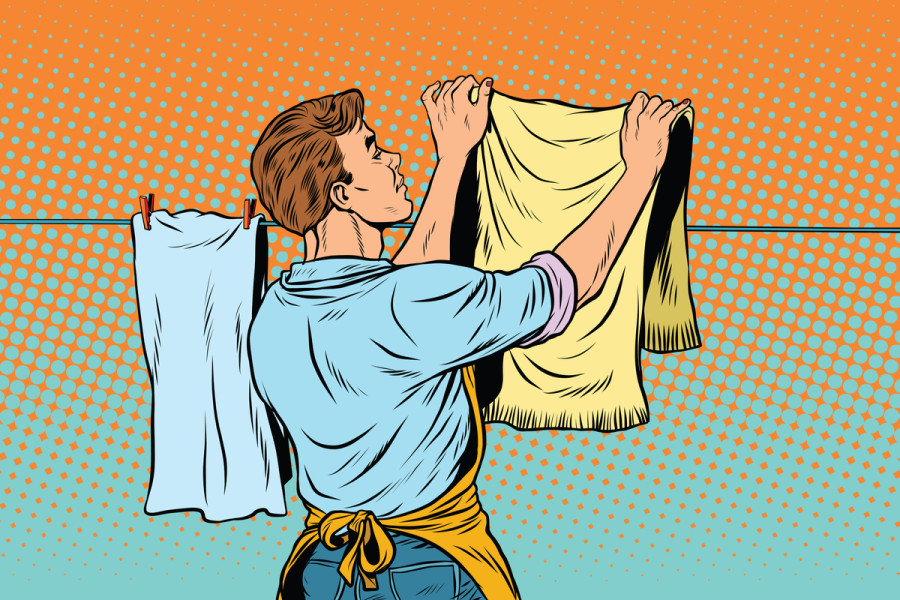Columns
The virus is reshaping lives
The lockdowns offer a chance for macho men to learn to become peaceful househusbands.
Hisila Yami
Many articles have been written on Covid-19 and its effect on women. But the virus has taken a greater toll on men. Covid-19 has taken away their formal jobs, robbed them of their outside world, displaced them from their public space, and snatched away their unlimited freedom. Robbed of their manhood, they feel naked. It has taken away men's patriarchal power. The novel coronavirus has trapped men in their homes. They are forced to live with the ‘second sex’, their wives. They have suddenly come face-to-face with home economics and management, the underbelly of the economy. The home was a secondary place where they came to eat, sleep and engage in the bare minimum of socialisation. It was never a meaningful place with meaningful people for them. Now they are confused because the pandemic has disrupted power relations at home.
In a total transformation from the one-dimensional work they are used to, they are suddenly confronted with multitasking, decentralisation and micromanagement. And patriarchy has not prepared them to face this domestic world. Men are not prepared to admit women’s supremacy at home, but they are faced with the soft power which they don't know how to handle. Instead of helping women in their chores and socialising with family members, they assert their supremacy, further deepening the gender divide. This opens up old contradictions, the contradiction of unequal division of labour between men and women. Home is already a stressful place for the macho man, and Covid-19 has added another level of stress, amplifying domestic violence at both local and global levels.
Not knowing how to fight the gendered effect of the virus, men are resorting to drinking heavily, smoking non-stop, taking drugs and watching porn. And this has led to violence against women, children and elderly family members. The novel coronavirus has revealed just how deep macho stereotypes run through society. What makes male violence even more harmful is that it is easily ignored and readily forgotten. In doing harm to their wives, they are destroying their own family and weakening their own body and their own identity. It is to be noted that higher inequality leads to lower social bonds, leading to more polarisation that ultimately affects the control mechanism needed to combat Covid-19 at home.
The current crisis provides an opportunity to lift both men and women to a higher level of interaction by sharing household management. A happy conjugal life is good for boosting the immunity of the family, community and country. Covid-19 has given an opportunity to share home management. Women are equally to blame for not making men gender-friendly. I have seen self-styled feminists telling their husbands to mind their own business when they try to help them with their household chores.
Men should understand that masculinity in the face of Covid-19 is getting them killed in greater numbers than women. According to data collected by Global Health 50/50, in the vast majority of countries where data is available men are dying at a higher rate from Covid-19 than women. In Nepal, the Health Ministry has confirmed 58,327 Covid-19 cases as of September 16, out of which 43,681 were male and 14,646 were female. Similarly, the total death due to coronavirus was 371, of which females only numbered 100.
Convinced of their own invincibility, men defy all recommended health precautions—refusing to wear masks, wash their hands and maintain social distancing. Those who are obsessed with being 'men' should be told that they can be ‘real men’ by protecting their families and communities. We can encourage a gender-friendly environment starting from home. At this time of the Covid-19 crisis, it is important to self-heal, boost one’s immunity power and increase inner strength. For this to happen, one has to be a vehicle of change for the betterment of humanity which consists of both men and women.
Change is the buzzword in this period of crisis. Those who refuse to see change must understand that even the nature of the coronavirus is changing. It is important to note that by changing yourself, you change others. Equally important to realise is that by changing others, you change yourself. Men must understand that both genders constitute equal and integral parts of humanity and both are needed to perpetuate the human life cycle. They need to be united as ever in this hour of struggle against the Covid-19 pandemic.
The abundant free time provided by the lockdown can be used for introspection—to reflect on one’s life, and the family and society one is living in. It allows men to connect with their social life and household work, and to become humane. It can transform them from committing intimate violence to engaging in an intimate love life. And women need to cooperate with men because Covid-19 is giving them a big opportunity to understand and engage in care work and house management. It must be noted that household work and management contribute greatly towards creating social and economic welfare. Similarly, the care work done by families at the micro-level during the pandemic is vital for the survival of this underdeveloped country.




 11.78°C Kathmandu
11.78°C Kathmandu















